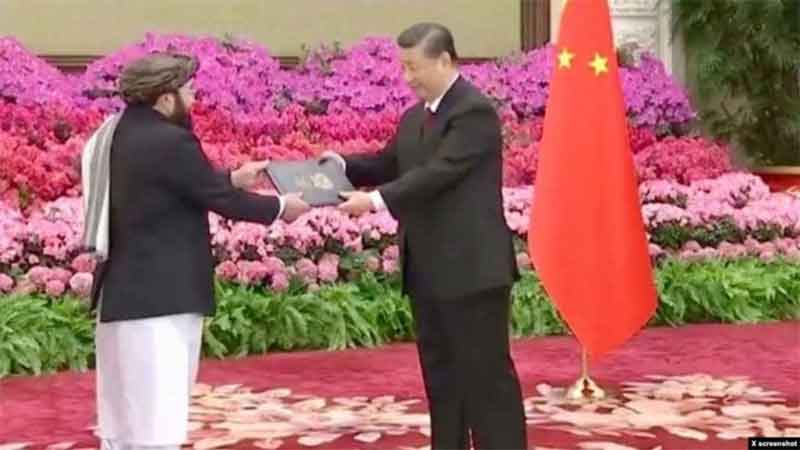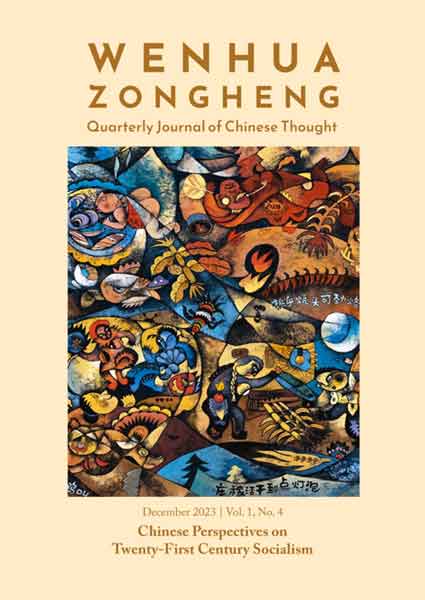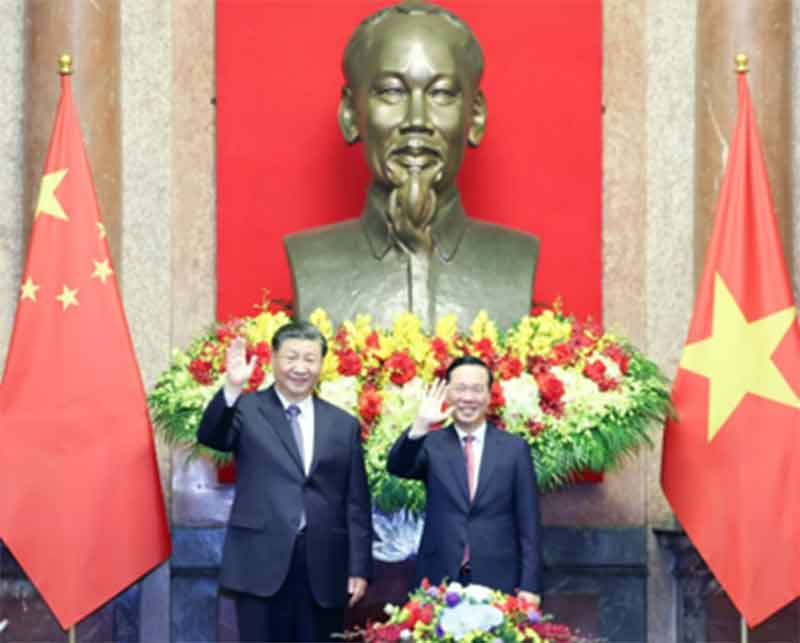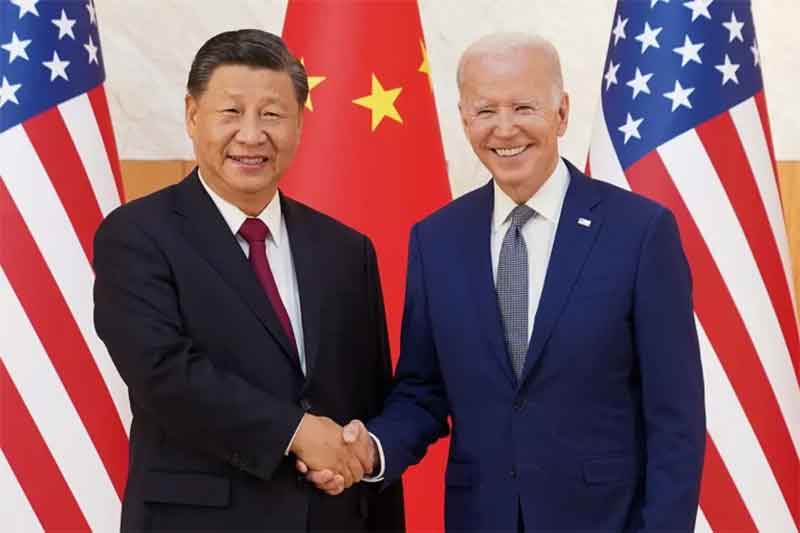
“Communist Victory in Beijing, China “ (photo by Andre Vltchek)
In this review article, we remember Andre Vltchek who passed away last year Sep 22, was a friend of all oppressed peoples, who travelled far and wide to scores of countries. And reflect on his views about China that recently (Oct 1) celebrated its revolution, significant in the context of CPC@100. The subject is relevant and important even as the Biden dispensation launched its New Cold War against China, ostensibly to defend democracy, and unveiled a new AUKUS, in addition to its QUAD.
Modi-led India, mouthing multi-lateralism, and with democracy as an alibi, unabashedly allowed itself to be roped in by the US super power and its Asia-Pacific Hegemony project. This one is not mere cold war, but is hotting up into a potential military conflict, with nuclear dimensions, backed by hundreds of military bases in the region, reminiscent of Vietnam days of 1960s and 1970s. By Modi-regime joining the QUAD, India is being entangled in a dangerous situation.
The article also throws light on the other burning global question of environment, and China’s alternative in an Ecological Civilization, highlighted by Vltchek. China led by Xi Jinping reiterated its commitment to this approach. This approach set long-term critics of China’s path, like those of Monthly Review, to reconsider the gamut of their views in a Special issue in July 2021 to mark CPC@100.
***
Apart from being a writer, film-maker and a reporter, Vltchek was an activist who was scholarly. This dimension was less noticed. He introduced himself, in an article two years ago thus:
“Those of us who are close to the China’s Academy of Social Sciences, or to the Chinese leading universities and media outlets, are doing our best to explain the errors committed in both Soviet Union and the so-called Eastern Block. Based on the analyses of its own past, and of other socialist countries, China is both fighting for the survival of the world, and for the improvement of the standards of living of its own people.”
“While perfecting its own socialist system, China learned a lot about the mistakes made by the Soviet Union. It is not going to repeat them,” he wrote.
As CPC recently celebrated its birth centenary last July 1, this aspect about Soviet Union was debated in Chinese party and non-party circles, how it was one factor that was behind Socialism with Chinese characteristics.
As China celebrated its National Day October 1, amid a climate of Biden-led NEW cold war, beefed up by the new, NATO-like AUKUS, and amid concerns for ecological devastation emanating from imperialist model of development, it is useful to recall the optimistic writings of Vltchek.
“Attacking China is turning into the most lucrative career for both the mediocre journalist working for the mass media outlets and for the funding-starved individuals all over the world,” he wrote:
“It goes without saying that China is being intimidated and provoked by almost all Western countries, as well as their client states.”
(See Why I Stand By The 70 Years Old, Communist China, 14/10/2019
https://countercurrents.org/2019/10/why-i-stand-by-the-70-years-old-communist-china)
In a later article, China – US Media War, Vltchek wrote:
Washington loves to snap at “undemocratic nations”. But the truth is, both the United States and the United Kingdom, in unison, have managed to create a thoroughly and truly undemocratic global system of governance, economic practices and “information” (in fact – disinformation)…
In summary, if you pay for “information” invented, manufactured and refined in the U.S. and Europe, by the Western press agencies and television networks, you will be just fine and get patted on the back.
Especially if that information is helping to maintain global political and economic dictatorship of the West. So, if you pay for getting your people brainwashed and indoctrinated, you will be ranked high on the various “freedom of information” indexes…
“Many citizens in the West do not trust their own media, anymore”
Russian, Chinese, Latin American and even Iranian media outlets are becoming extremely influential in the educated circles in the West. It is because many citizens in Europe and the United States do not trust their own media, anymore. They are turning for information to such media outlets as RT, China Daily, CGTN, PressTV, NEO and Telesur.
Washington promotes competition, ideological and commercial, but only when it suits its interests, meaning, when it is winning. When its ideology or products begin to stumble behind the competitors (China, Russia, for instance), it immediately imposes sanctions, or introduces censorship.
These ‘key issues’, of course, include China…China is seen in the West as the most ‘dangerous’ adversary…
Western media has sold out. It is despised, ridiculed. It is paid to attack countries such as China, Russia or Venezuela.
He wrote the above in the Trump era. Biden is more aggressive along the same path, events confirm.
Ironically, China is attacked by imperialists as well as some of those who claim to be anti-imperialist, as he wrote:
“Reasons for these attacks are only too easy to identify: The People’s Republic of China is clearly winning in all fields and areas, over both the imperialism and savage capitalism: ideologically, intellectually and socially.”
Though China tops the table in terms of GDP- it is among the top 5 for the last few years- it actually is a Third World country hard-pressed for resources.
China’s per capita GDP, $ 8612 is more than four times that of India at $ 1980, but only 15 % of that of USA at US 59939 dollars. Still it is quite low, even among third world countries, see comparable data (in US dollars for 2017): Qatar 61264, Saudi Arabia 20747, S.korea 29958, Hong kong (though part of PRC, it is a different economic entity, with a capitalist system allowed officially) 46733. China’s is only 15 percent compared to that of USA. Despite that, Vltchek wrote…
“With only a fraction of the GDP per capita China is eliminating extreme poverty. Its infrastructure is now better than that in the West. Its progress in the field of ecology cannot be matched by any other part of the world. Its creativity, in the area of culture and science, is colossal. The life of the Chinese people is improving, dramatically. And, it is very hard not to notice, the lives of the people in the countries that are working with China, are getting much better, as well.”
“The only outcome the West would accept would be if China would kneel, surrender, and give up its “Socialism with the Chinese characteristics” system,” he wrote having felt the pulse in the West: “And this is unacceptable to both the government in Beijing and to the people of China.”
“I am not too interested in reading and listening to the endless analyses of the Westerners regarding China. I am interested in what the Chinese people have to say about their country!”
Vltchek wrote frequently on China, but was least featured by Indian media, except few like Counter Currents. Our media picks up only anti-China materials, has no objectivity at all.
We shall see two important issues of the modern world, democracy and environmental problems…also in relation to China.
Views expressed by Vijay Gokhale, a Sinologist, and India’s former Secretary, Ministry of External affairs, MEA, given below, are relevant, and need to be seen along with those of Vltchek.
*** ***
“Democracy”, the “biggest and the “greatest”, facing the “Dragon”
There is a notion promoted by ruling classes and the media, both in the West and in India, that China advanced better and faster because there is no democracy there, as if it is a curse India invited for itself.
With all his criticism for the Chinese system, Gokhale recently said in a recent interview:
“We very glibly explain China’s remarkable economic transformation as a direct outcome of its non-democratic form of government. As if even today, the Chinese government can decide to build a road through any basti or chawl in Mumbai and there is no opposition to it…
“Frankly when the Cold War ended, the Chinese were as challenged as we were. We both took different paths. And they pursued economic reform with a single-minded purpose of quadrupling the GDP. And in that process, they made many compromises with policy andthey showed greater flexibility. We must acknowledge this and not pretend that it is simply because they have a dictatorial system, whereas we have a democratic one, that they have been able to achieve much more.”
About India he says:
“The second is that I suppose a constitution when it is made after you would have been, for want of a better word, enslaved for 150 years, also means you don’t really have the wherewithal to make the perfect constitution. To make a perfect government, you go along the way, and you keep making changes.”
He says we have poor information, our own, about China.
“First, because government has begun to rely more on outside resources, since within government there is limited time and ability to study countries like China…
“Notwithstanding that, we also have a larger structural problem, which is that our educational system is still oriented towards the West. If we are to pick 10 Indians who are studying in universities, and ask them to name 10 American cities, or the last five American presidents, there is a much greater probability that they will get this right than if we ask them to name 10 Chinese cities or the last five Chinese presidents.”
“Which takes me to the point that a lot more writing has to be done on China… in a way that can be absorbed by our younger generations. Because if we don’t do that, we risk making misjudgments and having misconceptions about a country which is not only a neighbour but is now a superpower.”
The Long Game: How the Chinese Negotiate with India, is the second, the latest book authored by Gokhale. The interview was related to that.
His first book that went in for a reprint within weeks was :
Tiananmen Square: The Making of a Protest – A Diplomat Looks Back by Vijay Gokhale (May 23, 2021) HarperCollins, Pp 181 (with index).
When we do not know them well, how can we negotiate with them? … “there was no encouragement to academics and scholars to pursue China studies” though that has somewhat changed over the years, said Gokhale.
“India has a superpower on its doorstep. Yet the Indian public, including its elites, understand very little about its neighbour’s politics and what drives its policymaking. “Almost nobody in India, including the highly educated elite, would be able to intelligently discuss Chinese politics for more than 10 minutes. But of course, we will all have an opinion on American politics,” said Vijay Gokhale, who was India’s Ambassador to China, in later 1980s, Tiananmen Student revolt days :
“I would take great issue with the West, because one of the things I pointed out in my book is that the West was hardly objective on Tiananmen, they were actually following (their) government line. They weren’t objective.”
“It is no longer possible for the western media to hide their hypocrisy, and they have lost their credibility,” wrote Gokhale. We were prejudiced by such sources.
(scroll.in interview, Aug 14, 2021.)
(https://scroll.in/article/1002685/interview-vijay-gokhale-on-why-india-should-not-assume-chinas-success-is-due-to-lack-of-democracy)
Gokhale’s statement in relation to China is nearer the truth, and that on USA sounds true, but is questionable.
We do not care to know that dragon in China’s culture is not a ‘cruel deadly’ animal as it is shown in the Indian media visuals. Dragon is a spiritual creature that symbolizes “great power, good luck, and strength.” It represents power and authority, particularly control over typhoons, water, rainfall and floods. To those who believe in astrology and the like, it is the best zodiac sign, not a bad omen.
US the greatest democracy, is our “ally”, we are told by PM Modi after his latest America trip. We do not care to look into its brazen violations both at home (racism, Black Lives matter, largest number of prisoners, many without trial for years etc etc) and abroad, with brazen policies of hegemony and regime change policies, that are the very anti-thesis of democracy.
Vltchek on Western democracy
We are told China has no democracy, no popular media, and people are brain-washed. Andre Vltchek (1963-2020), Soviet-born American media person, was brutally frank about US and the West:
“ This world is being brutalized and controlled by the fascist clique of Western nations. There is no ‘democracy’ left in this world, as there is near zero respect for international law in North American and European capitals. Colonialism has returned in full force. Western imperialism is now almost fully controlling the world…
“ Now, the situation is the same. Or worse, perhaps much worse, because the West has nukes and a tremendous propaganda apparatus: it controls human brains all over the world with ‘mass media’, and ‘education’.
“And because the citizens of the West are now much more brainwashed than the Germans and Italians were in the late 1930’s and early 1940’s; more brainwashed, more scared, submissive and more ‘disciplined’…
He suggested the remedy, pay back in their own coin:
“Regime change is urgently needed…in Washington.”(Monthly Review, February 27, 2019)
https://mronline.org/2019/03/08/regime-change-is-urgently-neededin-washington/
Many in India take pride that America sets India in the league of democracies, without bothering to know about democracy itself, which is more an alibi for hegemonism.
Gokhale pointed out one side of the reality:
“My perspective is that there is no one democratic path. Merely because the West introduced parliamentary democracy into India does not mean that that is the gold standard for democracy. Because ultimately, if we take Abraham Lincoln’s Gettysburg Address, where he says “government of the people, for the people, by the people,” then it is the people who determine the shape of the government.”
And BR Ambedkar by whom we swear by had gone deeper into it, the role of people, and said, as if visualizing India’s future, in September 1943:
“ People do not govern themselves; they establish a government and leave it to govern them, forgetting that it is not their government. That being the situation, Parliamentary Democracy has never been a government of the people or by the people and that is why it has never been a government for the people. Parliamentary Democracy, not withstanding the paraphernalia of a popular government, is in reality a government of a hereditary subject class by a hereditary ruling class.”
“ It never made even a nodding acquaintance with equality. It failed to realize the significance of equality, and did not even endeavour to strike a balance between liberty and equality, with the result that liberty swallowed equality and has left a progeny of inequities.”
https://countercurrents.org/2017/04/the-forgotten-message-of-ambedkar-to-the-working-class/
Façade of democracy : Rule by Minority Vote
Perhaps lovers of this kind of democracy welcomed and enjoyed this inequity. Chinese shunned it and have their own People’s Democracy, and their own election.
But Samir Amin, renowned economist and political scientist, made a most revealing observation in an interview to frontline.in, May 11, 2018:
“ The French Revolution said liberty and equality. The so-called American Revolution did not project this target. The word “democracy” does not appear in the U.S. Constitution. And democracy was considered a danger. The system was invented to avoid this danger. The system did not change the relations of production. Slavery remained a decisive part of the system; (First US President 1789-1797) George Washington (1732-1799) was an owner of slaves.”
We have seen how Trump issued warnings and exposed the fraud and fragility of US democracy when he lost (he contests the verdict) the poll. Democracy there is no more than a hand-maid of big corporate plunderers and merchants of death, and it is a State that allows brazen racism against Blacks, Muslims, and others. This is notwithstanding a democratic society many people cherish.
India is ruled by a model of electoral democracy, with political parties contesting elections, and the party or coalition that is supposed to have won majority becomes the ruling party. Indian Constitution does not contain even a word about political parties. And it never had rule by a party, or even an alliance, that won “majority votes;” no party ever got 50 percent plus votes, even out of votes polled, not total voters, since the first elections of 1950.
Let alone BJP, even NDA as the winning alliance won only 45 percent of the polled vote in 2019, compared to 38 % in 2014. Closest to that figure (50%) was Rajiv Gandhi (PM after Indira Gandhi’s murder, elected with sympathy vote); he was a pilot who never wanted to come into politics. As per the Constitution (Article 356), any state government, elected just like the Centre, can be dismissed by the Centre – and President Rule may be imposed; it was done, not sparingly, but more than 100 times.
UK’s Conservative party got 43.6 % of votes poled in 2019, the highest for any party since 1979. Its highest was in 1955, and that was short of 50%..,49.7. The highest ever vote by the Labor party was in 1951..that was short of 50 percent…it was 48.8.
Germany was ruled by Angela Merkel (with 33 % vote in 2017, 35 in 2005) for four terms, whose party (CDU, that ruled for almost 50 out of the last 70 years) never got 50 percent vote. In fact, no party ever got it since Second World War. In fact, the winner and loser together also never got 50 percent vote since then. And wonder, the winner and the loser joined hands to form government, that is what they did under Merkel…just sharing the spoils, after hard-bargaining, benefiting the large corporates.
After centuries of democracy, US never had a woman as its president. Germany’s Merkel was the first woman chancellor. UK had only two women (Ms Thatcher and Ms. May) Prime Ministers in all its history. They lecture others. Conservative Islamic Pakistan and Bangladesh, not to speak of India and Srilanka, had women as prime ministers though it is no sign of women’s empowerment.
And democracy is aided by a media that is corporate-controlled, anything but democratic, and an instrument to manufacture consent.
Thus democracy is not even necessarily a rule by majority, as it is imagined to be.
Chinese socialist democracy
Chinese Communist Party leaders assert they have “Chinese socialist democracy” for what they describe as a participatory representative government. In a November 23, 2002 interview, the then-Chinese ambassador to Egypt, Liu Xiaoming, said:
“I think what we are practicing today is Chinese socialist democracy, which is represented by the National People’s Congress and a broad participation of the Chinese people. In fact, in today’s China, the political participation at the grassroots level is much higher than any western country you can name of. We have grassroots level democracy demonstrated by village election. The turnout is 99 percent, i.e. 99% of villagers participating in this political process to elect their village leaders, comparing with only less than 50% of participation in election process in many western countries.”
(cited in a wikipedia article)
And Chinese people at the grassroots have a say on agriculture, on industry, on environment. It is not mere electoral democracy. Note Gokhale’s remarks.
But India and USA are democracies and allies! Fighting against the dragon!
*** ***
“China has its own socialism,don’t be judgmental”
Vltchek wrote :
“ China, a mighty Communist country, (or call it a “socialist country with Chinese characteristics”), is being mocked and humiliated by Western propaganda. Arrogance of the European and North American indoctrinators and most of their servile pseudo-intellectuals, from the so-called center to the right, has no boundaries. Most of them are suffering from incurable superiority complexes. They feel that they have the right to judge China; to decide for it, whether it is “truly” Communist or not, and whether it is on the correct track…”
China’s determined march towards the ecological civilization
(Following are extracts from an article, May 16, 2018, by Andre Vltchek, in Monthly Review, online.)
https://mronline.org/2018/05/16/chinas-determined-march-towards-the-ecological-civilization/
(This piece by Adam Vltchek on ecological civilization in China includes a nice interview with John B. Cobb, Jr., and and also mentions Monthly Review authors Zhihe Wang and Meijun Fan (see below). Cobb is a friend of MR and supporter of the ecological Marxist tradition that has emerged from pages of the magazine and press. As the article shows, Cobb is clearly playing an important role in China…MR Eds.)
The West is flexing its muscle, antagonizing every single country that stands on its way to total domination of the Planet. Some countries, including Syria, are attacked directly and mercilessly. As a result, hundreds of thousands of people are dying.
Political and potentially military disaster is simultaneously ‘complemented’ by the ecological ruin. Mainly Western multi-national companies have been plundering the world, putting profit over people, even over the very survival of the human species.
Western politicians see absolutely no urgency in all that is taking place around the world, or more precisely – they are paid not to see it.
So, are we now dealing with the thoroughly hopeless scenario? Did the world go mad? Is it ready to get sacrificed for the profit of the very few? Are people simply going to stand passively, watching what is happening around them, and die, as their world goes literally up in flames?
It appeared so, until few months ago.
Then, one of the oldest cultures of Earth, China, stood up and said
No! There are different ways to go forward. We could all benefit from the progress, without cannibalizing, and fully destroying our Planet.
China, led by President Xi, accelerated implementation of the concept of so-called Ecological Civilization, eventually engraving it into the Constitution of the country.
A man who did tremendous work in China, working tirelessly on the Ecological Civilization concept in both China and in the United States, John Cobb Jr (93) , has been, for years, a friend and close comrade of mine. He is a brave ‘alternative’ and optimistic voice coming from the United States…he had expressed worries that China and its leadership could go ‘either way’, in regard to the “Ecological civilization”.

Andre Vltchek and John Cobb Jr.
China’s growing commitment to Eco-civ
I recalled our meeting in Claremont, when John expressed worries that China and its leadership could go ‘either way’, in regard to the “Ecological civilization”, possibly even against it. Inside China and her leadership, there were apparently voices defending ‘pure economic growth’ approach. Now the Chinese Parliament has written the goal of ecological civilization into the national constitution.
I wanted to know what does it mean, practically? Is there a reason to celebrate?
John replied via email:
Something like fifteen years ago, the Chinese Communist Party wrote the goal of an ecological civilization into its constitution.
Nevertheless, the phrase meant more than just trying to minimize the ecological damage done by rapid economic growth. It expressed an understanding that the natural world was constituted of ecologies rather than just a collection of individual things. And it clearly indicated the desirability of human activity fitting into this natural world rather than replacing it…
However, Chinese leaders did recognize that simply postponing the work for clear skies and a healthy environment would not work. The nation needed to work on economic growth and a healthy natural environment simultaneously.
It began evaluating the success of provincial governments by their achievements in these two distinct realms. Growth goals were set below what would be possible, so that it could be channeled in less environmentally harmful directions.
Experiments with ecovillages received encouragement.
The talk of moving toward an ecological civilization also encouraged reflection about “civilization” alongside “market.” That supported those Chinese who were concerned that the narrow concern for wealth at all costs was not healthy for human society… The idea of recovering traditional Chinese civilizational values gained in acceptance.
However, the changes at the recent Party congress tended to strengthen commitment to ecological civilization. President Xi, who has been central to the moves toward ecological civilization was given another five years. He and others reiterated the goal and affirmed steps in its direction.
To reinforce the Chinese commitment, the Parliament has written the goal of ecological civilization into the national constitution. ..
The Chinese people do not feel that the Party’s commitment is oppressive or foolish. We can have considerable confidence that China as a nation in genuinely committed and that the people share a hope for becoming an ecological civilization.
John Cobb’s role in China
John Cobb is a well-known figure in the PRC. His thoughts are having great impact on an influential group of Chinese leaders. “Through most of my life, the last thing I anticipated was to have a role in China.
The Communist Party (by efforts of many) was persuaded to shift its policies from the continuing depopulation of rural China to the development of the thousands of villages that were slated for destruction.
Policies have changed, and in 2016 for the first time, more people moved from cities to countryside than from countryside to cities. Development of villages has been emphasized along with the goal of ecological civilization in last fall’s crucial meetings of the Communist Party. It seems highly probable that this important shift in Chinese society will endure.
Obviously, the shift was primarily due to the work of many Chinese. However, harsh criticism by Americans of the consequences of industrializing agriculture in the United States played a role. Again, my voice was only one of many.
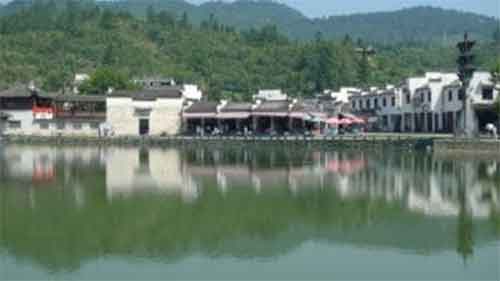
Ancient Xidi Village in China (photo by Andre Vltchek)
Centralized Power
In many ways, China became the leader, when it comes to ecology, as well as combining traditional culture with modernity. It is determined to build the entire civilization around its ecological and cultural concerns.
It appears that in the future, the ‘markets’ and financial considerations may play important but secondary role. Is it mainly possible because of the centralized/Communist nature of the Chinese political and economic system (including the central planning)?
Clearly in China it has been the leadership of the central government that has set the course, done the planning, and implemented what it planned. For those of us who believe the world needs urgently to move toward ecological civilization, this has worked well.
There was still the possibility that representatives of other factions in the Communist Party, who sought to replace Xi, might treat him as a “lame duck.” Now that the impossibility of a third term has been removed, that danger also is gone. An extended period of leadership can probably make some policies so identified with the nation that they will continue even if a successor is not personally committed to the goal of ecological civilization.
All of this is to say that centralized power is currently working in a remarkably promising way not paralleled by other countries with less centralized political power.
Even so, I have more confidence in endurance in China with its centralized control than in European countries more directly subject to popular opinion.
As I compare China’s success in giving serious attention to the well-being of its natural environment and needy citizens with that of European countries, my reason for betting on China is that I have some confidence that it will maintain governmental control of finance and of corporations generally. If it does this, it can also control the media. Thus, it has a chance of making financial and industrial corporations serve the national good as perceived by people not in their service. Less centralized governments are less able to control the financial and other corporations whose short-term interests may conflict with the common good.
There is an old adage in the West: power corrupts, and absolute power corrupts absolutely. I think the Communist Party in China works hard to socialize its members to resist corruption. I think it has been largely successful.
I think that at the present time, the Chinese Communist Party is more successful in cultivating a commitment to the common good than are the churches in the West. That may be more important than the question of how centralized the power may be.
Commitment to the common good
I wrote to John that during our recent encounter, he stated that one of the reasons why China succeeded in so many fields, is because it can count on many people in its leadership, who are truly concerned about the well-being of their country. This fully coincided with my own experience that I gained in the PRC.
But how does John see the West? How different is it in the West? Is the Western leadership constructed on thoroughly different principles? He replied immediately:
“Near the end of my answer to the previous topic I made the statement that I believed the Chinese Communist Party was more successful in eliciting concern for the wellbeing of China and all its people than the Western churches were in eliciting commitment to the common good. For many Christians, this is surprising. Christians have tended to think that we need belief in God to ground our ethical commitments.
No one supposes that a theistic ethic is the only way that people can be socialized with respect to action. ..
For many theists, right and wrong are so bound up with God that when they hear that Marx was an atheist, they assume he had no ethics…
The percentage of Western people who take seriously belief in a God who calls us to serve the common good is probably less that the percentage of Chinese who understand themselves to work with the dialectic of history to overcome the class society that leaves so many abused and oppressed.
Among Americans, the “American exceptionalism” into which the school system socializes youth plays a larger role… I am attributing to the American educational system the inculcation of American exceptionalism. However, it officially eschews even this value. Its goal is to be “value-free,” which means in practice, in the service of money. The whole culture celebrates the value of being rich…
And, alongside the general culture, in the Communist Party, a substantial number of people are socialized in Marxist thought and values. It is because Marx has more influence in China than Jesus has in the West, that the chances of China to lead the world toward salvation are better than the chances of the West to do so.
(About Andre Vltchek
Andre Vltchek is a philosopher, novelist, filmmaker and investigative journalist. He has covered wars and conflicts in dozens of countries. Three of his latest books are his tribute to The Great October Socialist Revolution a revolutionary novel Aurora and a bestselling work of political non-fiction, Exposing Lies Of The Empire. )
***
Marxism, Ecological Civilization, and China
Environmental issues are a burning question of the day. John Bellamy Foster, editor of Monthly Review, and an expert on “ecological Marxism”, wrote on China (June 12, 2015). He has been a sharp critic of Chinese model for long. Now there is a change in his assessment, ecology being an important factor in that.
Extracts are given below
Marx and Engels addressed in their writings most of the ecological problems of modern times: climate change (then seen as a regional phenomenon); soil degradation; air and water pollution; overexploitation of natural resources; overpopulation; deforestation; desertification; industrial poisons or toxins; and the destruction of species.
In The Dialectics of Nature Engels observed: “Let us not, however, flatter ourselves overmuch on account of our human victories over nature. For each such victory nature takes its revenge on us. . . . Thus at every step we are reminded that we by no means rule over nature like a conqueror over a foreign people, like someone standing outside nature — but that we, with flesh, blood and brain, belong to nature, and exist in its midst, and that all of our mastery of it consists in the fact that we have the advantage over all other creatures of being able to learn its laws and apply them correctly.”
China’s Ecological Civilization and Marxism
China’s leadership has called in recent years for the creation of a new “ecological civilization.” Some have viewed this as a departure from Marxism and a concession to Western-style “ecological modernization.” However, embedded in classical Marxism, as represented by the work of Karl Marx and Frederick Engels, was a powerful ecological critique. Marx explicitly defined socialism in terms consistent with the development of an ecological society or civilization — or, in his words, the “rational” regulation of “the human metabolism with nature…”
What is clear about the present Chinese emphasis on ecological civilization is that it has emerged out of a broad socialist perspective, influenced by both Marxian analysis and China’s own distinct history, culture, and vernacular.
In China, as opposed to the West, the land remains social or collective property and cannot be sold. I believe it is wrong therefore to see China’s initiative in the construction of ecological civilization to be a direct outgrowth of Western-style ecological modernism, as some have supposed. At the 17th National Congress of the Communist Party of China (CPC), in 2007 it was officially proposed that China should build an “ecological civilization,” creating more sustainable relations between production, consumption, distribution, and economic growth.
At the18th National Congress of the CPC in 2012, “ecological civilization construction” was written into the CPC Constitution. These principles were built into the latest five-year plan (2011-2015). Although many have questioned the seriousness of the CPC’s commitment to the construction of an ecological civilization, it is evident that this: (1) arose out of real needs in China, where there has been enormous ecological devastation; (2) was a response to the growth of massive environmental protests throughout China; and (3) has been followed up by massive government efforts in area of planning, production, and technological development.
(The above lines reflect the way democracy works there: massive protests, and massive response. It is not like what is happening to farmers’ protest movement in India, an electoral democracy, with all its fascist laws and features. . They indicate different models of democracy. )
Is China Moving in the Direction of Ecological Civilization?
There is no doubt that Chinese leadership has made significant steps toward a more sustainable development. Due to the large role of planning China has been able to make rapid changes in a number of areas, going at times against the logic of economic growth.
Examples of such efforts are: (1) targeted reductions in economic growth justified in terms of more environmentally balanced growth; (2) the massive promotion of solar and wind technology; (3) a growing share of non-fossil-fuel energy consumption; (4) creation of a red line to protect a minimum of 120 million hectares of farmland; (5) reduction of major air pollutants by 8-10 percent in the 12th Five Year Plan (2011-2015); (6) removal of six million high-pollution vehicles from the roads in 2014; (7) a 700 percent increase in the output of electric passenger cars (non-plug ins) in 2014; (8) initiation of a government campaign for frugal lifestyles and against extravagance (conspicuous consumption) by officials; (9) growing official criticism of GDP worship; and (10) a pledge to reduce the carbon intensity of GDP by 40-45 percent by 2020 from 2005 level, coupled with a pledge to reach peak carbon dioxide emissions by 2030, if not sooner; and (11) the imposition of a new resource tax on coal.
He discusses challenges ahead. That was in 2015.
(Jun 12, 2015 by John Bellamy Foster)
https://mronline.org/2015/06/12/foster120615-html/
Xinhua Oct. 1 reported the latest situation:
“ Amidst fluttering flags and floral decorations on the streets and public squares, the People’s Republic of China (PRC) celebrated its 72nd birthday, rejoicing the fruitful achievements of the past year and envisioning a bright future ahead…The year 2021 marks the centenary of the Communist Party of China (CPC) and China has realized the goal of building a moderately prosperous society in all respects, with absolute poverty eliminated…”
“Prosperous society” has an important component: Green development
“ One of the key characteristics of China’s socialist modernization is human-nature harmony, Xi pointed out.
He has repeatedly underscored the importance of environmental protection in inspection trips and chaired several high-level meetings on advancing ecological civilization this year. Xi stressed the importance of improving global environmental governance, actively responding to climate change and creating a community of life for man and nature, in his statement delivered via video at the general debate of the 76th session of the United Nations General Assembly in September.
Xi also reiterated the commitment he made last year that China will strive to peak carbon dioxide emissions before 2030 and achieve carbon neutrality before 2060.”
http://www.news.cn/english/2021-10/01/c_1310221799.htm
(The author was a media person, and a political commentator who contributed several articles to the countercurrents.)

